
We seem to have suddenly shifted from the doom and gloom of robots taking our jobs to people proclaiming that AI is going to create millions of new jobs. And if you haven’t endured this latest round of hype, I envy your unique skill in removing fake news from your life.
Suddenly AI is the antidote to automation! Really?
Don’t we have a responsibility to inject some reality into this conversation? Today’s business world is about removing physical touchpoints, about fixing our data, about running processes faster, smarter, more autonomously, and cheaper… So where are the real links between the universities, the politicians, and the businesses? Why aren’t we really debating this stuff in the senates and parliaments if today’s organizations are on an inexorable drive to sub people for better data? Instead, we have academics and “analysts”, desperate for attention, making unsubstantiated predictions that are only fuelling the tech firms, desperate to sell their wares without this negative connotation that the real ROI of selling their products is tied to labor elimination.
Let’s just make the call – AI is indirectly and inextricably tied to the elimination of “unnecessary” labor, by nurturing systems that get smarter with each incident and transaction. The smarter and more autonomous your operations become, the more agile and efficient your business becomes. That’s not a terrible thing – in fact, you are doing your valued staff a huge favor by keeping them employed and keeping them relevant to your business. But you are not creating a net influx of jobs into your organization, you are becoming more fluid and competitive. Sure, you’ll probably look to add some Python and R developers, Machine Learning experts, serious data geeks and design thinkers – or you may just pay consultants to do it all for you – but the bottom-line, here, is that you’re going to be shedding a lot of your left-brained staff performing jobs that can be artificially automated, at a much faster rate than you’ll be adding the data-oriented people you need to digitize your business. AI is about doing more with less, not more with even more – let’s get real.
Don’t get me wrong, the possibilities of faster, smarter, touchless data flows between the customer and the operations of the business, are critical to promote competitiveness and survival, but let’s stop sugar-coating the true purpose of data driven intelligence – the less businesses need to rely on people and the more autonomously they can run processes, the more nimble and profitable they will become. Now if these businesses then choose to reinvest their new-found wealth hiring loads more people, I will tip my hat to these purveyors of job hope, but let’s fact facts, the companies of the future will be running a lot of smart technology with a smaller group of savvy people to manage it all.
Let’s take our much-loved services industry, which is pretty high up the tech-savvy ladder and comprises firms where efficiency and competitiveness are its very DNA
The global IT and BPO services industry employs 16 million workers today. By 2022, our industry will employ 14.8 million – a likely decrease of 7.5% in total workers (see our research methodology and full blog here). This isn’t devastating news – we’ll always lose this many people through natural attrition, but what this data signifies is this industry is now delivering more for less because of advances in automation and artificial intelligence technologies. The new data also shows how job roles are evolving from low skilled workers conducting simple entry level, process driven tasks that require little abstract thinking or autonomy, to medium and high skilled workers undertaking more complicated tasks that require experience, expertise, abstract thinking, ability to manage machine-learning tools and autonomy.
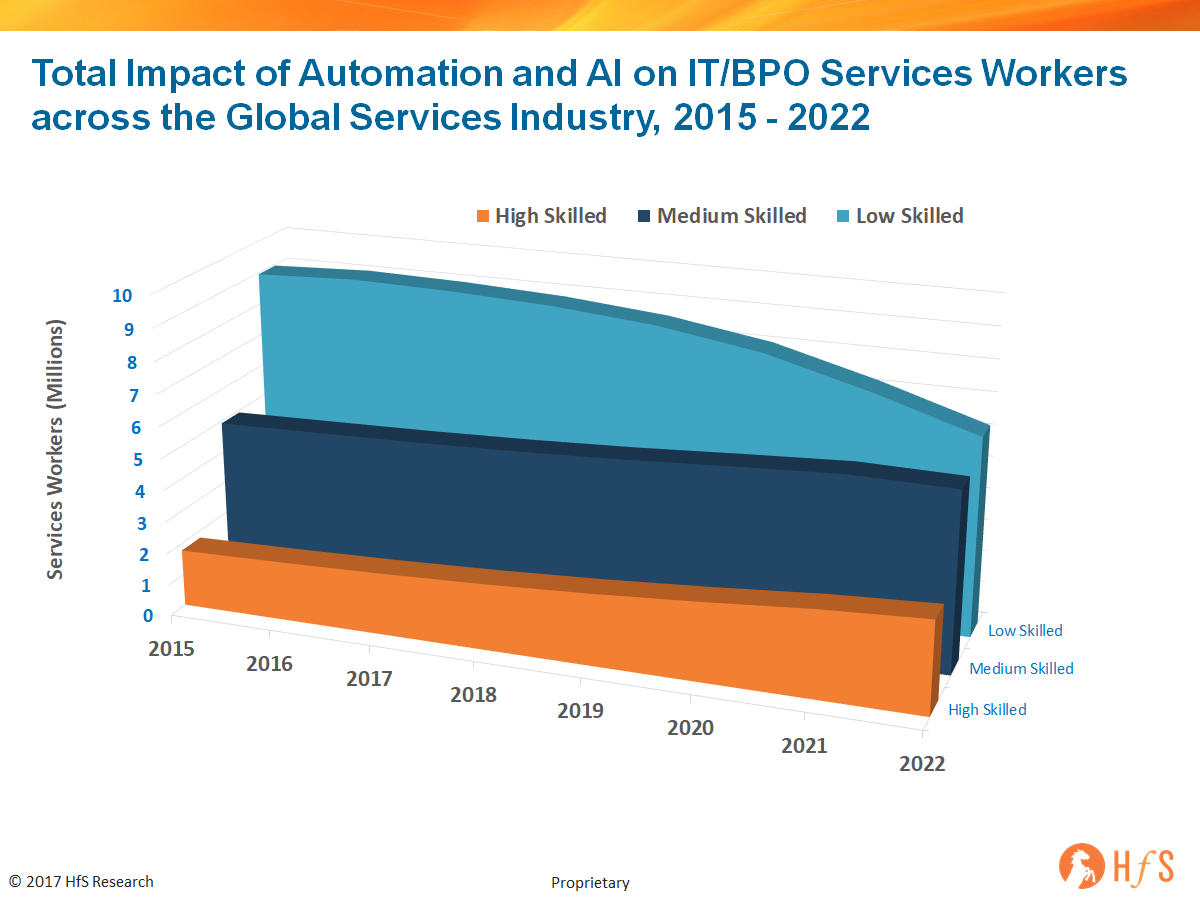
All major service delivery locations are expected to be impacted at the low-end, but the higher the wage costs, the higher the expected role elimination (750,000 roles in India and a similar number in the US)
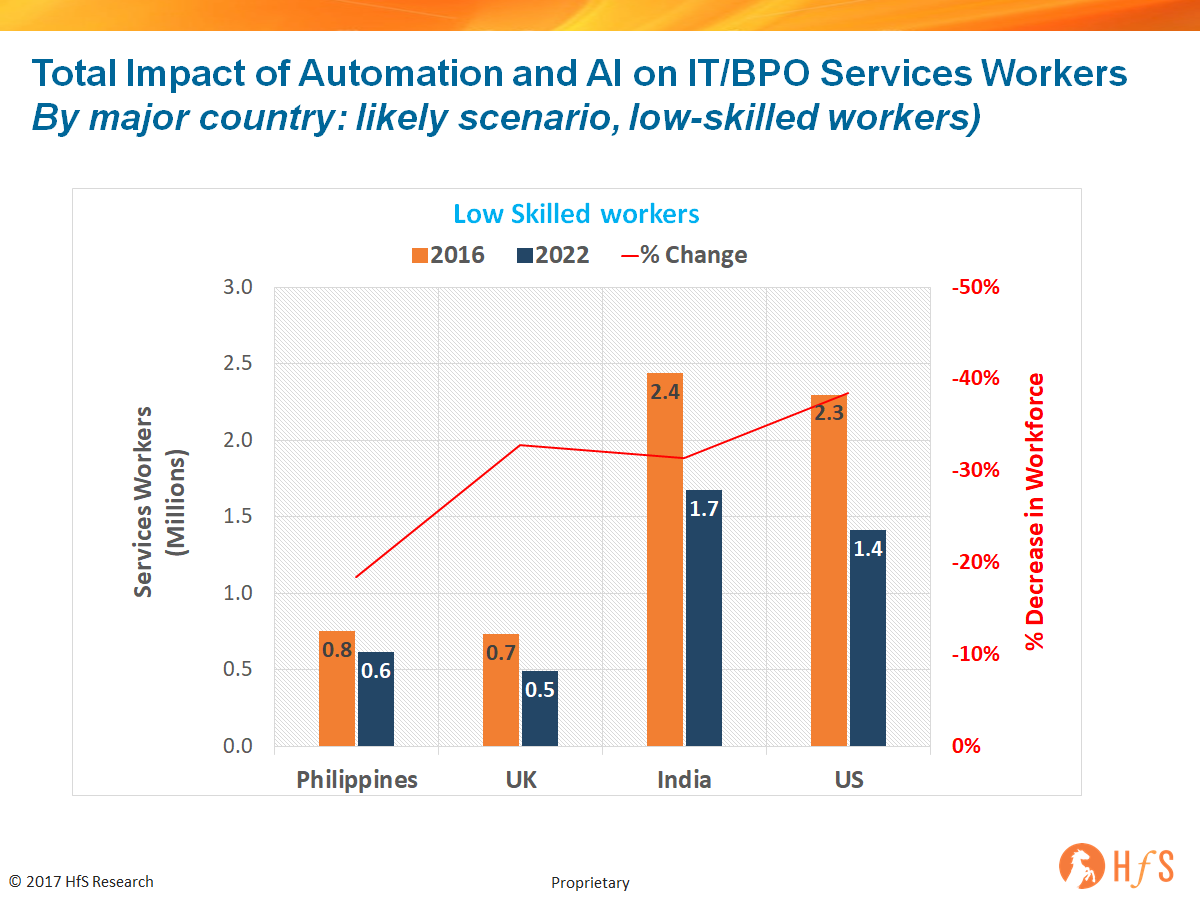
Medium-skilled roles are picking up across the board, especially in roles that are customer/employee facing with the need for more customized support, the ability to handle basic customer and data queries, and more customized service work with virtual agent models in 2nd / 3rd tier escalations:
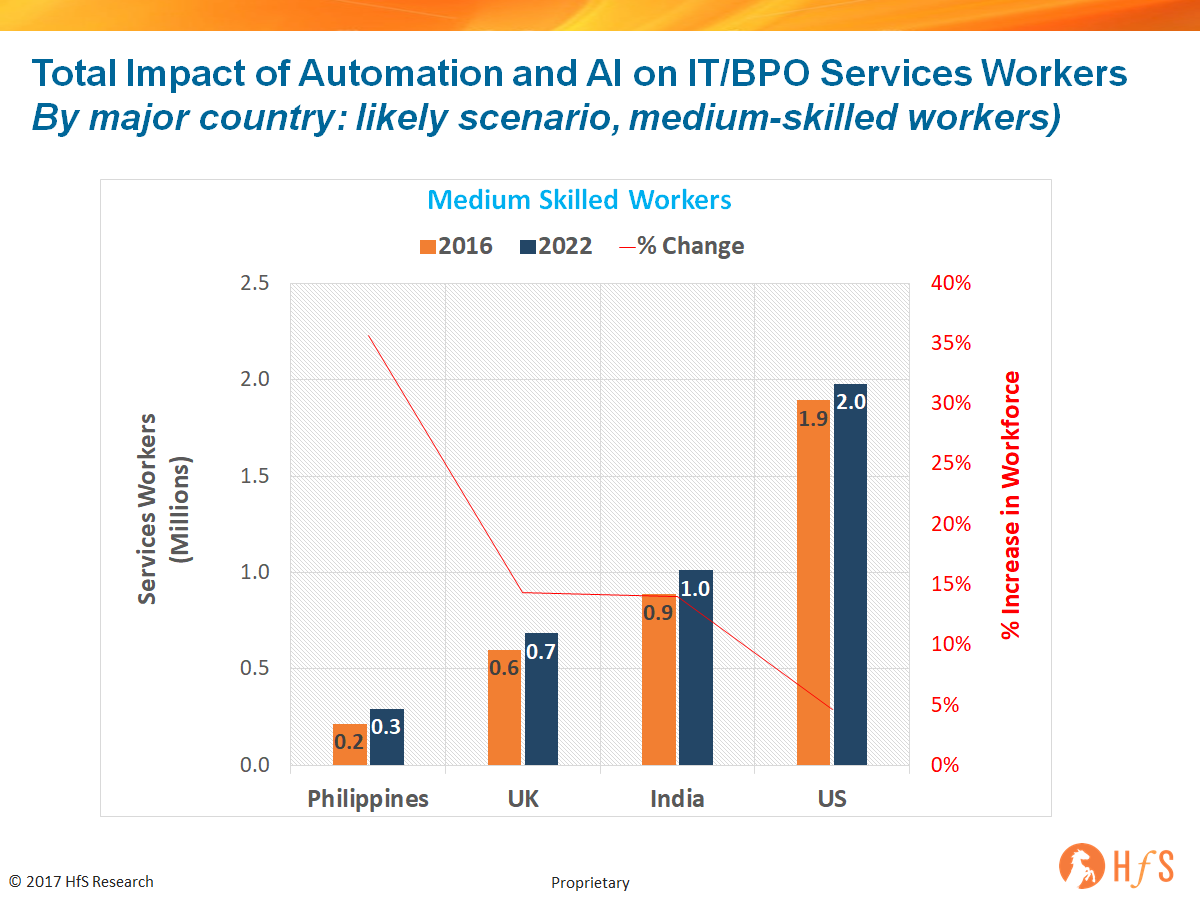
When we look into the high-end, this is where we see most positive impact, in terms of job creation:
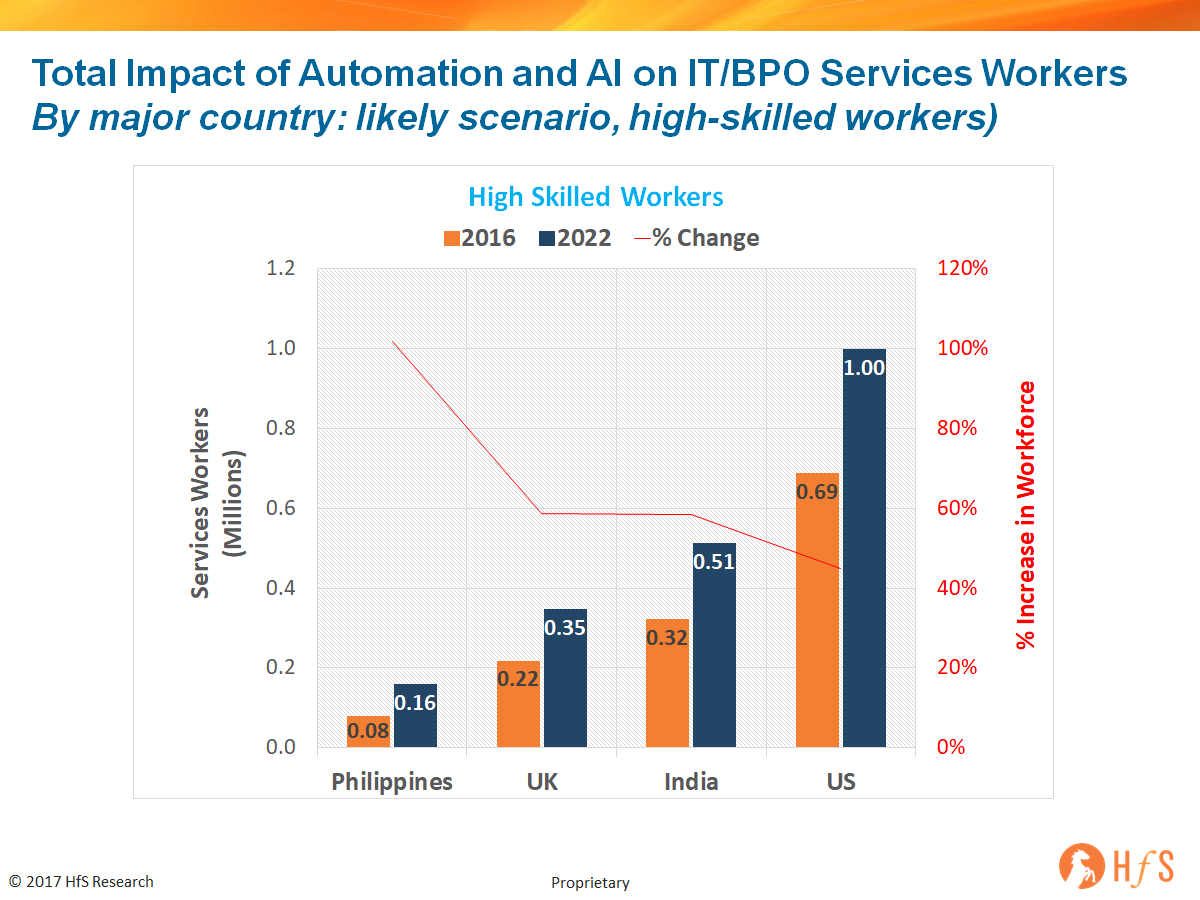
As this data illustrates, the more we automate, and digitize, and the more we adopt human + machine technologies, such as machine learning and cognitive solutions, the more we need people to develop skills in managing automated workflows, Machine Learning mechanisms, being able to interpret data, and service increasingly complex customer and employee needs. So when we take into account the total impact of automation and AI on services jobs, the impact is not nearly as severe as so many of the hypesters and fear-mongerers are prophesizing, but the reality is we’re definitely not creating jobs faster than we are digitizing them out of existence:
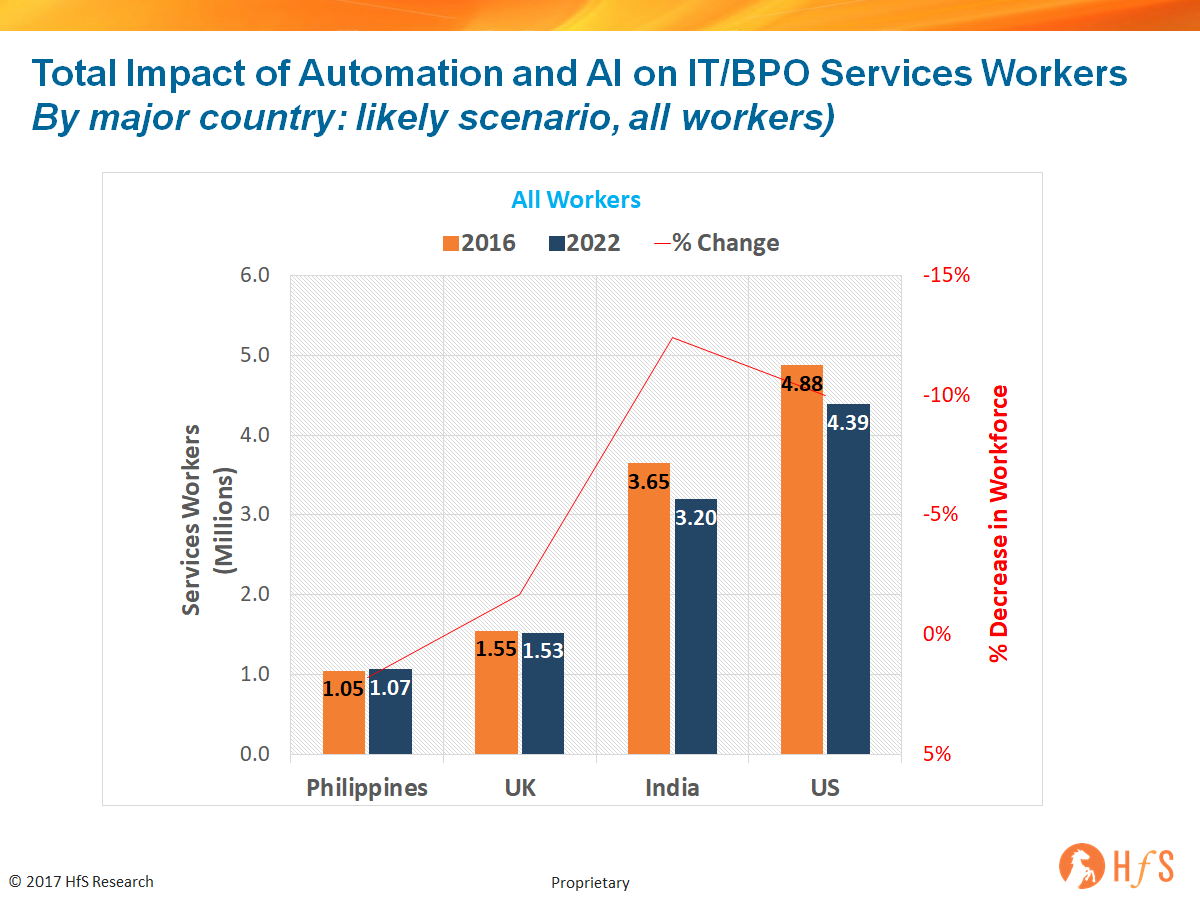
Philippines should actually increase its service delivery population due to its dominance in voice and capabilities to support increasingly complex and personalized customer models, the UK should be flat, especially with the challenges of Brexit and the slowdown in low cost worker immigration, while both India and the US will see a total worker reduction estimated at the 10% level between by 2022. You can view the total impact on the global services industry – a worker population decline of 7.5% here:
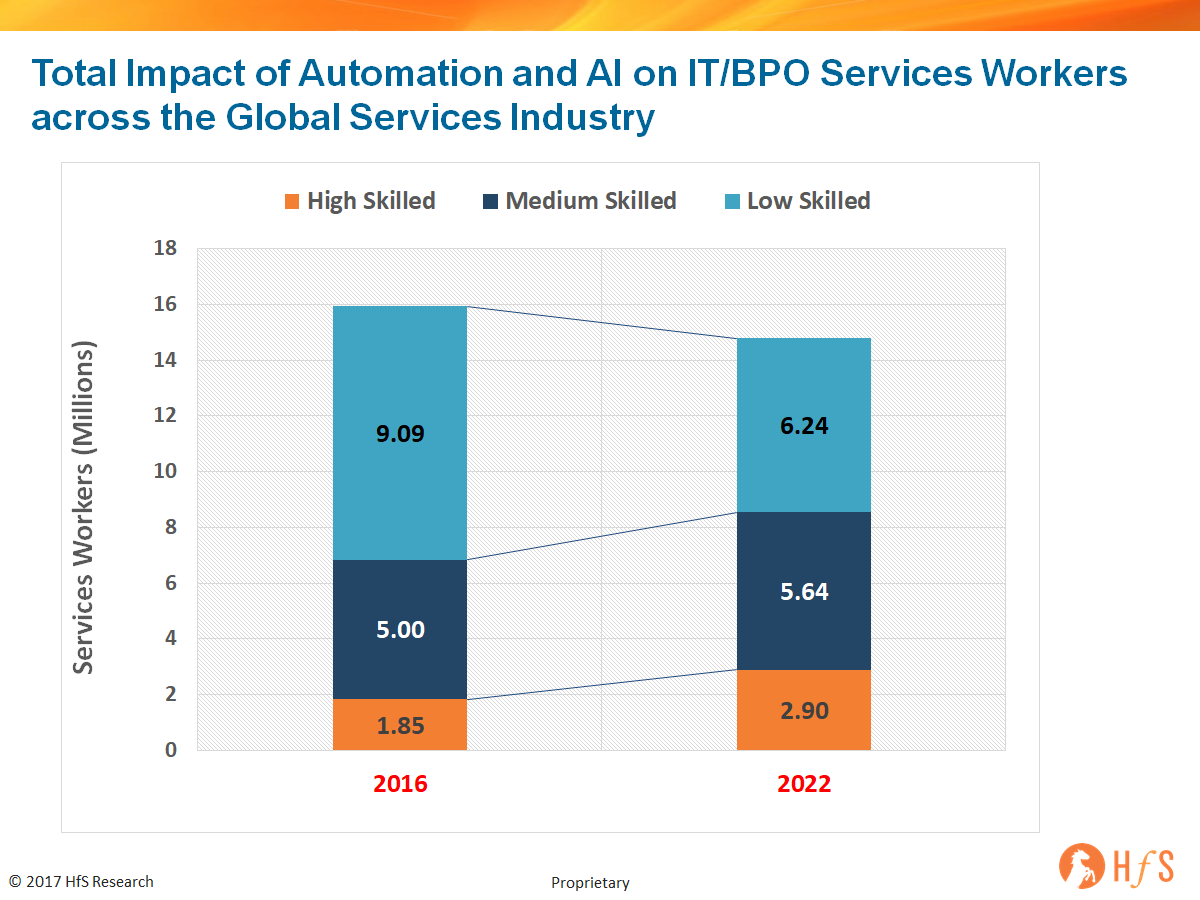
The Bottom-line: Many jobs that can be digitized are going to disappear, but there is time on our side to develop the new skills we need
The big narrative here isn’t about what’s going away, but more about what is emerging in its place. The next fives years we can manage, it’s the five after that when the impact on labor becomes much more challenging. Transaction roles at the bottom of the value chain have been under threat for many years now – with the impact of low cost location delivery and better technology. Now the emergence of RPA is eventually going to sound the death knell for most high-throughput, high-intensity jobs, as both service providers and enterprises master the ability to apply these technologies effectively. The good news is this takes time and there is no huge burning platform to do this overnight from most enterprises.
So our message to all stakeholders of operations and services is simply to get out of your comfort zones, accept that new skills are replacing old ones, and it’s critical we have a plan to train, develop and invest in changing what we have. I will leave you with six things to think about as you ponder your own value to this industry and your firm:
- Which customers have you delighted recently?
- What new relationships have you made that add value to our business?
- What work have you done that excited people inside and outside of the business?
- How are you helping energize your colleagues and exciting them with new ideas?
- How have you helped add value to new business wins?
- How have you contributed to new initiatives that improve productivity and effectiveness?
HfS subscribers can access the full report and research methodology by clicking here
Posted in : cognitive, Digital Transformation, Robotic Process Automation







I think it will create millions of jobs in tech but it will remove 10s of millions of jobs in return. Unfortunately very soon the largest diversity issue is not going to be race, gender, or preference – it’s going to be technical understanding. This will separate new tribes.
Phil,
In a perfect scenario AI will create better jobs for humans; jobs where creativity, divergent thinking, even empathy are not only a nice to have but imperative (let’s call them-) skills to handle the daily activity
Corina
Hi Phil..appreciate your efforts to ‘de hype ‘ ..1 question though..for mid level managerial role which are not technical (e.g.process transformation)..what exactly the reskilling will involve?.I am not sure everyone has to learn technical skills and try and move to a technical career because digitization is in.With digitization there would still be functional and business roles…
..how should functional consultants upgrade w/o necessarily becoming pure technical roles?
@Krish: The topic du jour – and for the foreseeable future – is massively around change management and transformation of data that plagues processes that are ill-equipped for automation. We do not need Python developpers to figure out how to fix basic data convergence issues, and how to build a culture of inclusion amonst staff to get onboard the automation and AI transformation agendas. Plus, so much of this new software is designed for non-technical people to manage. I do not advocate everyone becoming technology experts overnight, but instead need to become real experts in recognizing pooly converged data, how to fix obsolete processes and how to motivate staff to get on the train and work on fixing one broken process and manual workaround at a time.
PF
Phil –
Neither the “AI will boost productivity” case nor the “AI will create millions of jobs” case is anywhere close to being established. All that we know is that AI is removing certain types of jobs in specific types of processes and is creating a few different types of jobs that existed only in academia and research before.
The rest is well “fake news” or “alternative facts”, whichever 🙂
Sri
AI, Automation is forcing a general shift in skill sets, few years back we used to have Genpact, EXL making huge job transitions from US. It created thousands of jobs in India, all it required was average IQ+ english communication skills. But now things are changing jobs needs not be transitioned, they could be simply eliminated. Industry would be led by few % of techno-functional leaders. It would also lead a boom to data oriented sciences and works. If you notice several support jobs are long gone, Training, Hiring etc. are now outsourced on higher management ratios
Sure AI will create new kinds of jobs; however, there will be a huge net loss of jobs as we know them, i.e. productive type., because, AI Automation creates exponential levels of productivity. With the right type of leadership and people being proactive about their individual and political choices however, creative solutions can be found for the huge net job loses with the huge levels of additional wealth created by AI Automation.
JS
John Slagboom – reality check 1, current productivity growth levels in most Western economies incl the US, UK and Australia is currently at 1% levels, lower than it was in the mid-80s!!
Reality check 2, Treasuries yield curve is flattening rapidly and could even be inverse by the end of the year. Meaning, nobody in the global bond market is betting on the “exponential levels of productivity” theme
Reality check 3, show me ONE organization globally in ANY industry esp a financial institutionthat has used RPA over the last 5 years or so to achieve Cost to Income ratio and Return on Equity statistically superior to its peers?
Yes, there are plenty of gee-whiz claims being made in the nain-stream media but NONE can survive serious scrutiny!
The pundit vs. client paradox. Most pundits overstate potential job losses, and co-mingle full job loss with automation of certain activities within a given job, to make noise associated with their names in the market. Clients understate – either delusionally or to avoid a Luddite-like uprising of aging office workers (recalling the similar uprising driven by offshore services outsourcing – potential partial or full job losses.
Sri, my comment really isn’t just about AI or Automation, rather the net value creation from all Fourth Industrial Age technologies. They should overall, create way more wealth than they destroy. Number of jobs, will decrease most likely, sure and that is a serious negative in terms of meaning, purpose, and worth. The real issue is not technology, rather leadership; it always is. The extreme wealth gap is reaching revolutionary levels and technology, being just a tool only serves a good or evil end depending who is controlling it.
As long as employment is defined by present standards, FTE reduction is inevitable. Attention though has to be paid to price indexes relevant to Human Intelligence Tasks and how handmade or human-made items in the near future will command a premium. There may be a future in the making where we work part time and get paid more or as much as we did when working full time.
Phil – Glass half full or half empty? You can’t create new jobs without making the previous ones obsolete. Has been happening for a few million years now and accelerating. However, the rate of changing is making the transition costs unbearable for many, and this needs fixing
Federico